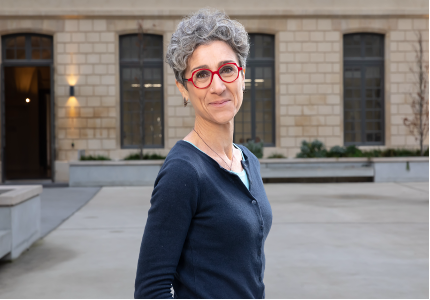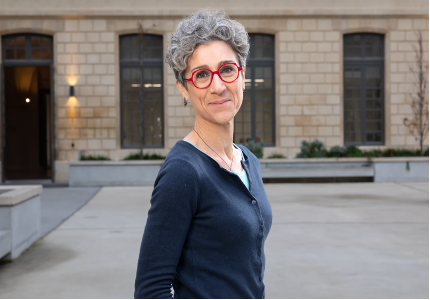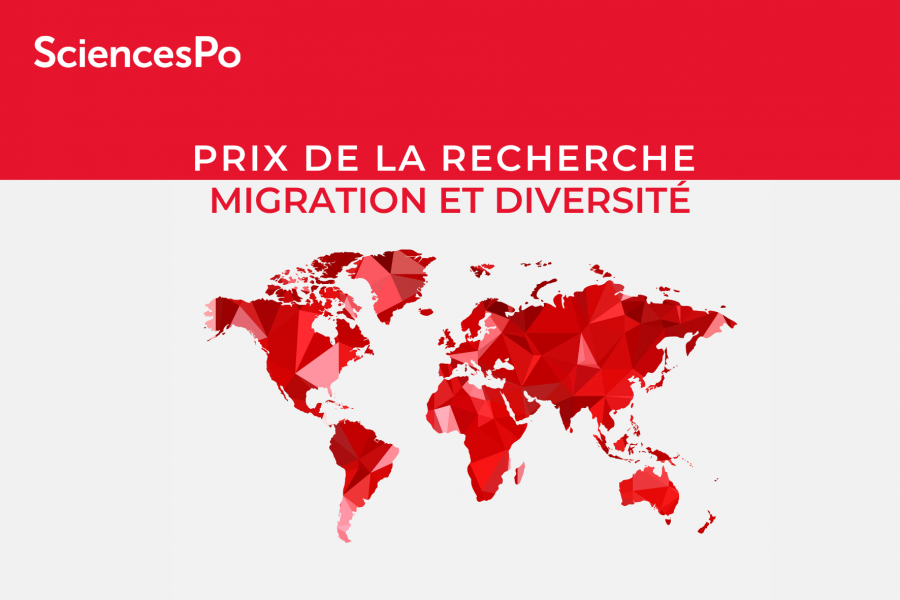

08/12/2023 [JOURNÉE D’ÉTUDES] EXIL ET MOBILISATIONS DANS LES DIASPORAS D’EUROPE DE L’EST
15 novembre 2023
Séminaire de remise du Prix de la recherche MiDi 2023 / 2023 MiDi Research Prize seminar
24 janvier 2024English below
COLLECTIF INTERDISCIPLINAIRE MIGRATION ET DIVERSITÉ (MIDI)
Le collectif interdisciplinaire Migration et Diversité (MiDi) de Sciences Po a le plaisir d’annoncer les lauréates de son Prix de la recherche MiDi 2023. Ce prix, lancé en 2023 pour la première fois, a pour but de récompenser les efforts exceptionnels de jeunes chercheuses et chercheurs au niveau Master et Doctorat à travers toutes les écoles et départements de Sciences Po, et accroît la visibilité d’une recherche rigoureuse et innovante sur les questions liées aux migrations internationales et/ou à la diversité ethno-culturelle.
MiDi a été créé en 2020 en tant qu’initiative collective interdisciplinaire dans le but de renforcer les interactions entre les chercheuses et chercheurs des différents centres de recherche de Sciences Po autour des questions de migration internationale et de diversité ethno-culturelle. Il met en lien les scientifiques du Centre de recherches internationales (CERI), du Centre d’études européennes et de politique comparée (CEE), du Centre de recherche sur les inégalités sociales (CRIS), de l’École de droit, du Département d’histoire, du Département d’économie, du Centre de recherches politiques de Sciences Po (CEVIPOF) et du Laboratoire interdisciplinaire d’évaluation des politiques publiques (LIEPP). La recherche produite à Sciences Po sur ces questions couvre des thèmes très variés, tels que les flux migratoires, le droit d’asile, les frontières, l’intégration des migrants, la discrimination et les inégalités dans les contextes européen et mondial.
Le jury, composé de Hélène LE BAIL (Sciences Po, CERI), Virginie GUIRAUDON (Sciences Po, CEE), Hélène THIOLLET (Sciences Po, CERI), Christophe POULY (Sciences Po, École de droit), et Mohamed ELSAYEH (Sciences Po, École de droit), félicite des excellentes candidatures et de leur nombre. Après délibérations, le jury a choisi de récompenser une doctorante et deux étudiantes en master comme suit :
- NIVEAU DOCTORAT

©Aurore Papegay
Soazig DOLLET (Sciences Po, Centre d’études européennes) pour son article Entre contrôle de l’image de soi et fermeture. Retour sur la grammaire des attitudes adoptée par des personnes réfugiées dans le cadre d’entretiens biographiques. Cet article, paru dans le Bulletin de méthodologie sociologique, est un article de méthode et de réflexivité qui aborde, entre autres, la question du positionnement quand on est en contrat de Convention industrielle de formation par la recherche (CIFRE), la question du rapport à l’enquêté quand on représente de manière ambiguë l’institution, mais amène aussi à parler du rapport des réfugiés aux institutions et à la société d’accueil. Le jury a trouvé l’article très stimulant et susceptible d’intéresser aussi bien les universitaires que les praticiens.
Après des études de Sciences politiques sur le monde arabe (DEA en 2003), Soazig Dollet a travaillé à l’instruction des dossiers de demande d’asile à l’OFPRA à Paris, avant de rejoindre le Comité international de la Croix Rouge et ses missions sur le terrain. En 2009, elle devient responsable du bureau Moyen-Orient & Afrique du Nord de Reporters sans frontières, organisation qu’elle quitte fin 2014. Devenue consultante, elle réalise des études sur l’accès des réfugiés syriens à une information de service en Turquie et au Liban.
En septembre 2019, elle intègre le Centre d’études européennes et de politique comparée de Sciences Po Paris, en tant que doctorante. Sous la direction de Virginie Guiraudon, elle travaille depuis à saisir le vécu – par les bénéficiaires de la protection internationale – des dispositifs d’accueil et d’intégration qui les ciblent. Ce travail de recherche a été réalisé dans le cadre d’une Cifre en collaboration avec la Fondation COS Alexandre Glasberg (2019–2022).
- NIVEAU MASTER

Noémie CASSIAU (Sciences Po, École des Affaires Internationales de Paris) pour son mémoire Everyday bordering near the territorial France-United Kingdom borderline. Ce mémoire sur la politique d’éviction à Calais, France est caractérisé par une écriture intéressante de dialogue continu entre les observations de terrain, la documentation de type « actualité » et les travaux de chercheurs. Le jury a également apprécié la méthodologie utilisée et la rigueur du style d’écriture.
Noémie Cassiau a obtenu une licence de sciences politiques à l’École européenne des sciences politiques et sociales (ESPOL), avant de s’inscrire au master Droits de l’homme et action humanitaire de l’École des affaires internationales (PSIA) de Sciences Po. Entre ses deux années de master, elle a pris une année de césure, dont la moitié a été consacrée à l’accompagnement juridique des victimes de racisme et de discrimination raciale au sein de l’association SOS Racisme. Noémie Cassiau a passé les six mois restants à Calais et à Dunkerque, en tant que bénévole auprès des observateurs des droits de l’homme, pour effectuer son travail de terrain dans le cadre de sa thèse de master intitulée « Everyday border near the territorial France-United Kingdom borderline ». Maintenant diplômée, elle est retournée à Calais, où elle travaille avec les observateurs des droits de l’homme en tant que responsable de l’administration et du terrain. Toujours exposée quotidiennement aux questions qu’elle a explorées dans sa recherche de master, elle espère approfondir les questions liées à la migration, aux frontières, à la racialisation et à la violence dans le cadre d’un futur doctorat.

Irène COELHO GASPAR (Sciences Po, École de la recherche) pour son mémoire Sortir les « Tos » de l’arrière-cour : trajectoires genrées, associatives et militantes de jeunes Portugais∙es de France (1960-1980). Le jury a apprécié l’approche socio-historique utilisée dans ce mémoire, qui se concentre sur la vie associative des Portugais.e.s de France, ainsi que l’analyse de Convergences 84 et la mobilisation des Portugais.es dans les débats contre le racisme et pour l’égalité.
Irène Coelho Gaspar a achevé un master d’histoire en juin 2023. Elle s’est orientée vers ce cursus à la suite d’un stage avec l’association ATD-Quart Monde, une structure tournée vers la recherche action et la recherche participative. Réaliser un mémoire représentait pour elle l’occasion d’en apprendre davantage sur l’histoire de luttes liées au féminisme et aux droits des immigré.es, deux engagements qu’elle porte au quotidien. Son travail lui a permis d’appréhender différemment des enjeux contemporains en lien avec ces thématiques.
Le comité de pilotage de MiDi adresse ses plus vives félicitations aux trois lauréates, qui sont invitées à Sciences Po le 31 janvier 2024 pour le séminaire de remise de prix, au cours duquel elles pourront présenter leurs recherches.
—————————————————————————————————————————————————————————————————————————
MIGRATION AND DIVERSITY (MIDI) INTERDISCIPLINARY COLLECTIVE
Sciences Po’s Migration and Diversity (MiDi) interdisciplinary collective is pleased to announce the winners of its 2023 MiDi Research Prize. This prize, launched in 2023 for the first time, aims to reward the outstanding efforts of young researchers at the master’s and PhD levels across all Sciences Po schools and departments, and raises the profile of rigorous and innovative research on issues related to international migration and/or ethno-cultural diversity.
MiDi was created in 2020 as a collective interdisciplinary initiative with the aim of strengthening interactions between researchers from different Sciences Po research centres around issues of international migration and ethno-cultural diversity. It brings together scientists from the Centre for International Studies (CERI), the Centre for European Studies and Comparative Politics (CEE), the Centre for Research on Social Inequalities (CRIS), the Law School, the Department of History, the Department of Economics, the Centre for Political Research at Sciences Po (CEVIPOF) and the Laboratory for Interdisciplinary Evaluation of Public Policies (LIEPP). The research produced at Sciences Po on these issues covers a wide range of themes, such as asylum and migration flows, the right of asylum, borders, the integration of migrants, ethno-racial discrimination and inequalities in the European and global contexts.
The jury, composed of Hélène LE BAIL (Sciences Po, CERI), Virginie GUIRAUDON (Sciences Po, CEE), Hélène THIOLLET (Sciences Po, CERI), Christophe POULY (Sciences Po Law School), and Mohamed ELSAYEH (Sciences Po Law School), was pleased with the number and quality of all applications. After deliberation, the jury chose to award the MiDi Research Prize to one PhD candidate and two master’s students, as follows:
- DOCTORAL LEVEL

©Aurore Papegay
Soazig DOLLET (Sciences Po, CEE) for her article Entre contrôle de l’image de soi et fermeture. Retour sur la grammaire des attitudes adoptée par des personnes réfugiées dans le cadre d’entretiens biographiques. This article, published in the Bulletin of Sociological Methodology, is an article on method and reflexivity that addresses, among other issues, the question of positioning when one is on a Convention industrielle de formation par la recherche (CIFRE) contract, the question of the relationship to the respondent when one ambiguously represents the institution, but also sheds light on the relationship of refugees to institutions and the host society. The jury found the article highly stimulating, and likely to be of interest to academics and practitioners alike.
After studying political science with a focus on the Arab world (DEA in 2003), Soazig Dollet worked on asylum applications at OFPRA in Paris, before joining the International Committee of the Red Cross and its field missions. In 2009, she became Head of the Middle East & North Africa office of Reporters Without Borders, an organization she left at the end of 2014. Now a consultant, she conducts studies on Syrian refugees’ access to service information in Turkey and Lebanon.
In September 2019, she joined the Centre for European Studies and Comparative Politics at Sciences Po Paris, as a PhD candidate. Under the supervision of Virginie Guiraudon, she has since been working to capture the experience – by beneficiaries of international protection – of the reception and integration schemes that target them. This research was carried out as part of a Cifre program in collaboration with the COS Alexandre Glasberg Foundation (2019-2022).
- MASTER’S LEVEL

Noémie CASSIAU (Sciences Po, Paris School of International Affairs) for her dissertation Everyday bordering near the territorial France-United Kingdom borderline. This dissertation, on evictions of migrants in Calais, France, interestingly brings together field observations, “news” documentation and the work of researchers. The jury appreciated the methodology used and the rigor of the writing style.
Noémie Cassiau obtained a Bachelor’s in Political Science from the European School of Political and Social Sciences (ESPOL), before enrolling in the Master’s in Human Rights and Humanitarian Action at Sciences Po’s Paris School of International Affairs (PSIA). Between her two years of master’s, she took a gap year, half of which she spent doing legal support for victims of racism and racial discrimination with SOS Racisme. Noémie Cassiau spent the remaining six months volunteering with Human Rights Observers in Calais and Dunkirk to conduct her fieldwork for her master’s thesis “Everyday bordering near the territorial France-United Kingdom borderline”. Now graduated, she returned to Calais, where she works with Human Rights Observers as administration and field manager. Still exposed daily to the questions she explored in her master’s research, she hopes to further explore issues related to migration, borders, racialization, and violence in a future PhD.

Irène COELHO GASPAR (Sciences Po, School of Research) for her thesis Sortir les « Tos » de l’arrière-cour : trajectoires genrées, associatives et militantes de jeunes Portugais∙es de France (1960-1980). The jury appreciated the socio-historical approach used in this thesis, which focuses on the associative life of people of Portuguese ethnicity in France, as well as the analysis of Convergences 84 and the mobilization of those of Portuguese ethnicity in debates against racism and for equality.
Irène Coelho Gaspar completed her Master’s degree in History in June 2023. She decided to complete this programme following an internship with the ATD-Quart Monde, an association focused on action and participatory research. Writing a thesis was an opportunity for her to learn more about the history of struggles linked to feminism and the rights of immigrants, two commitments she supports on a daily basis. Her work gave her a new perspective on contemporary issues related to these themes.
The MiDi steering committee extends its warmest congratulations to the three prizewinners, who are invited to Sciences Po on 31 January 2024 for a seminar at which they will be able to present their research.

